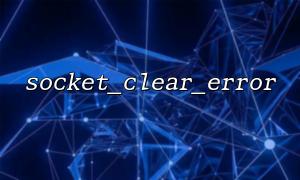Debugging is often a headache when developing Socket-based server programs using PHP. Especially when faced with some inexplicable connection failures, data reception interrupts or write timeout problems, developers usually rely on socket_last_error() and socket_strerror() functions to track the source of errors. However, these two functions alone cannot provide the clearest error context, and socket_clear_error() is particularly critical at this time.
In PHP Socket programming, socket_last_error() is a state query function that returns the last error code . But this "last time" may not be the "current operation" you imagined. Because PHP's Socket error status is globally reserved , as long as it is not explicitly cleared, even if you have performed a new operation, it may still return the error code left by the previous operation .
For example, the following code:
$socket = socket_create(AF_INET, SOCK_STREAM, SOL_TCP);
socket_connect($socket, '127.0.0.1', 8080);
$errCode = socket_last_error($socket);
echo socket_strerror($errCode);
If an error occurs in socket_create() and you get the error code immediately after socket_connect() , what you get may actually be the error left by socket_create() . This will cause great misleading in debugging.
To avoid interference from this "historical error state", we can call socket_clear_error() before each critical Socket operation to explicitly clear the previous error state. The biggest advantage of doing this is to ensure that the next socket_last_error() returns the error code generated by the current operation .
For example:
$socket = socket_create(AF_INET, SOCK_STREAM, SOL_TCP);
// Clear the previous error status
socket_clear_error($socket);
// Try to connect
if (!socket_connect($socket, '127.0.0.1', 8080)) {
$errorCode = socket_last_error($socket);
$errorMsg = socket_strerror($errorCode);
error_log("Connection failed:[$errorCode] $errorMsg");
}
The advantage of writing this way is that if the connection fails, you know that the error code must be caused by this connection operation, rather than a legacy error.
In large services, developers tend to push debug logs to a log service or presentation panel, for example:
$url = 'http://m66.net/log/record.php';
$params = [
'event' => 'socket_connect_fail',
'error' => socket_strerror(socket_last_error($socket)),
];
file_get_contents($url . '?' . http_build_query($params));
If you do not use socket_clear_error() in advance, the error message passed here may have nothing to do with the current failure event, ultimately making the logging "clean but untrusted".
When wrapping Socket operations using the try-catch structure, it is also recommended to call socket_clear_error() before each exception occurs. This will make the error message you get in the catch block more "accurate" and avoid confusing the real error points due to successive errors from multiple socket operations.
socket_clear_error() is a debugging tool that is easily overlooked in PHP Socket programming. By using it rationally, debug accuracy and log credibility can be greatly improved, especially when dealing with high concurrent connections or complex non-blocking communication logic. Developers should develop the habit of calling this function before key socket operations, thereby building a clearer and more reliable debugging system.













